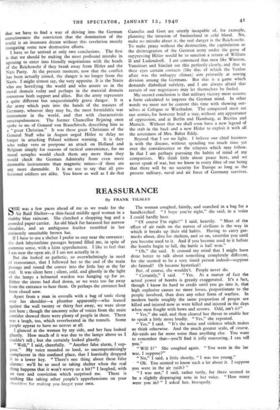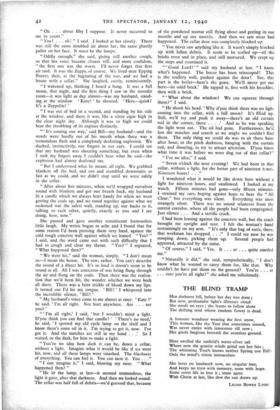REASSURANCE
By FRANK TILSLEY
SHE was a few paces ahead of me as we made for the Air Raid Shelter—a thin-faced middle aged woman in a shabby blue raincoat. She clutched a shopping bag and a crowded paper carrier. An old black fur harassed her narrow shoulder, and an ambiguous feather trembled in her eminently unsuitable brown hat.
If I have to use a shelter I prefer to stay near the entrance: the dark labyrinthine passages beyond filled me, in spite of common sense, with a faint apprehension. I like to feel that I am near the open air, if I am not actually in it.
But she looked so pathetic, so overwhelmingly in need of reassurance, that I followed her to the end of the main passage and round the corner into the little bay at the far end. It was silent here ; silent, cold, and ghostly in the light of the lamps a helmeted warden was hanging up for us. Either the sirens had died down, or we were too far away from the entrance to hear them. Or perhaps the entrance had been closed now.
Apart from a man in overalls with a bag of tools slung over his shoulder—a plumber apparently—who leaned against the wall twenty or thirty feet away, we were alone just here ; though the uncanny echo of voices from the main corridor showed there were plenty of people in there. There was a laugh, too, which reverberated in the tunnels. Some people appear to have no nerves at all.
I glanced at the woman by my side, and her face looked ghastly. How much of it was due to the lamps above us I couldn't tell ; but she certainly looked ghastly.
" Well," I said, cheerfully. " Another false alarm, I sup- pose." My voice sounded so loud, so uncompromisingly complacent in this confined place, that I hurriedly dropped it to a lower key. " There's one thing about these false alarms: we'll be so used to taking shelter when the real thing happens that it won't worry us a bit!" I laughed, with an ease and conviction which surprised me. There is nothing like taking other people's apprehensions on your shoulders for making you forget your own. The woman coughed, faintly, and searched in a bag for a handkerchief. " I hope you're right," she said, in a voice I could hardly hear.
" Of course I'm right!" I said, heartily. " Most of the effect of air raids on the nerves of civilians is the way in which it breaks up their old habits. Having to carry gas- masks about, dive for shelters, and so on, unsettles you until you become used to it. And if you become used to it before the bombs begin to fall, the battle is half won."
" Oh," she said. It crossed my mind that I might have done better to talk about something completely different, for she seemed to be a very timid person indeed—suppose she fainted! Or became hysterical!
But, of course, she wouldn't. People never do.
" Certainly," I said. " Yes. As a matter of fact the actual power of bombs is greatly exaggerated. It's a fact, though I know its hard to credit until you go into it, that high explosive causes no more losses, proportionate to the people involved, than does any other form of warfare. In modern battle roughly the same proportion of people are killed and injured now as were killed and injured in the days when men fought with bows and arrows. Odd, isn't it?"
" Yes," she said, and then cleared her throat to enable her to speak a little more loudly. " Yes," she repeated.
" Yes," I said. " It's the noise and violence which makes us think otherwise. And the much greater scale, of course. Air-raids are far more noise than anything else. You want to remember that—you'll find it jolly reassuring, I can tell you."
" Will I?" She coughed again. " You were in the last war, I suppose?"
" No," I said, a little shortly, " I was too young."
" Oh. You seemed to know such a lot about it. I suppose you were in the air raids? "
" I was not," I said, rather tartly, for there seemed to be a slightly disparaging note in her voice. " How many were you in? " I asked her, brusquely. " Oh . . . about fifty I suppose. It never occurred to me to count."
" You! . . . oh! " I said. I looked at her closely. There was still the same troubled air about her, the same ghastly pallor on her face. It must be the lamps.
" Oddly enough," she said, giving still another cough, so that her voice became. clearer still, and more confident, " the first one was the worst. I'll never forget that first air raid. It was the Zepps, of course. We lived near Epping Forest, then, at the beginning of the war, and we had a house with a cellar." She laughed, curtly, reminiscently. " I wakened up, thinking I heard a bang. It was a full moon, that night, and the first thing I saw in the moonlit room—it was light as day almost—was my husband, stand- ing at the window- Kate! ' he shouted. Here—quick! It's a Zeppelin! '
" I was out of bed in a second, and standing by his side at the window, and there it was, like a silver cigar high in the clear night sky. Although it was so high we could hear the throbbing of its engines distinctly.
" It's coming our way,' said Bill—my husband—and the words were hardly out of his mouth when there was a tremendous flash and a completely deafening explosion. We ducked, instinctively, our fingers in our ears. I could see that my husband was shouting something, but even when I took my fingers away I couldn't hear what he said—the explosion had almost deafened me.
" But I understood what he meant, all right. We grabbed blankets off the bed, and ran and stumbled downstairs as fast as we could, and we didn't stop until we were safely in the cellar.
" After about five minutes, when we'd wrapped ourselves round with blankets and got our breath back, my husband lit a candle which we always kept handy for when we were getting the coals up, and we stood together against what we reckoned was the safest wall, standing up, our backs to it, talking to each other, quietly, exactly as you and I are doing, here, now."
She paused and gave another reminiscent humourless little laugh. My wrists began to ache and I found that for some reason I'd been pressing them very hard, against the cold rough concrete wall against which we leaned. " Yes? " I said, and the word came out with such difficulty that I had to cough and clear my throat. " Yes? " I repeated, " What happened then?"
" We were hit," said the woman, simply. " I don't mean us—I mean the house. The row, rather. You can't describe the sound of a direct hit. It's so loud it doesn't seem to be sound at all. All I was conscious of was being flung through the air and flung on the coals. Then there was the realisa- tion that we'd been hit, the wonder whether we were both all there. There was a faint trickle of blood down my lips. It turned out I'd bit my tongue. Bill! ' I whispered into the incredible silence, Bill! '
" My husband's voice came to me almost at once. Kate !' he said, I'm all right. Not hurt anywhere. Are . . . are you? '
" I'm all right,' I said, but I wouldn't mind a light. D'you think you can find that candle? " There's no need,' he said, I spotted my old cycle lamp on the shelf and I know there's some oil in it. I'm trying to get it, now. I've got it. And the matches are still in my hand . . .' So I waited, in the dark, for him to make a light.
" You've no idea how dark it can be, down a cellar, without a light. Imagine what it would be like if we were hit, now, and all these lamps were smashed. The blackness of everything. You can feel it. You can taste it. You . . ."
" I can imagine it," I said, blowing my nose. " What happened then? "
" He lit the lamp, at last—it seemed tremendous, the light it gave, after that darkness. And then we looked round. The cellar was half full of debris—we'd guessed that, because of the powdered mortar still flying about and getting in our mouths and up our nostrils. And then we saw what had happened. The cellar door was completely blocked up.
" You never saw anything like it. It wasn't simply blocked up with fallen debris. It seem to be walled up—all the bricks even and in place, and still mortared. We crept up the steps and examined it.
" Good Lord!' " said my husband at last. " I know what's happened. The house has been telescoped! This is the scullery wall, pushed against the door! See, this part is the boiler—here's the grate. We'll never get out here—its solid brick.' He tapped it, first with his knuckles, then with a brick.
" What about the window? We can squeeze through there?" I said.
" He shook his head. Why d'you think there was no light coming into the cellar, with a full moon? It's filled up. Still, we'll try and push it away—there's an old curtain rod in the corner, there . . . .' And as he was speaking the light went out. The oil had gone. Furthermore, he'd lost the matches and search as we might we couldn't find them. The only thing we could do was to sit there hour after hour, in the pitch darkness, banging with the curtain rod, and shouting, to try to attract attention. D'you know what time it was before we were dug out of that cellar?"
" I've no idea," I said.
" Seven o'clock the next evening ! We had been in that cellar, without a light, for the better part of nineteen hours. Nineteen hours! . . ."
I wondered what it would be like down here without a light for nineteen hours, and swallowed. I looked at my watch. Fifteen minutes had gone—only fifteen minutes. I strained my ears, hoping against hope to hear the " All Clear," but everything was silent. Everything was most strangely silent. There was no sound whatever from the central corridor, where all the people had been congregated. Just silence . . . And a terrific crash.
I had been leaning against the concrete wall, but the crash brought me upright and taut. I felt the woman's hand restrainingly on my arm. " It's only that bag of tools, there, that workman has dropped. . . ." I could see now he was stooping down, picking them up. Several people had appeared, attracted by the noise.
" Of course," I said, " Yes. It . . . er . . . quite startled me."
" Naturally it did," she said, sympathetically, ' I don't know what he wanted to carry them for, like that. Why couldn't he have put them on the ground? You're . . . er . . . sure you're all right?" she asked me solicitously.



































 Previous page
Previous page